How To Resell Sneakers: Your Easy Guide To Make Money
The “sneaker resale” business is one of the biggest markets a student can start in. Being a student doesn’t mean you cannot make some income on the side. In fact, there are lots of side hustles that benefit students specifically. If you want to make some income while studying to achieve academic excellence, you could make money reselling sneakers. The sneaker market has grown tremendously over the past decade.
Millennials and Gen Zs love sneakers and add them to their fashion anytime they step out. This has driven the industry to an all-time high valuation over the past years. The sneaker resale area specifically was valued at over 6 billion dollars. This sounds insane, but the proceeds of this industry go to resellers like you.
If you want a quick way to make money as a student, especially if you are already a sneakerhead, reselling used sneakers and new ones in person and online is the way to go! In this guide, we bring you sneaker reselling tips for students, what to expect when you start your business, and some platforms you can use to make your work much easier and faster so you can make money as you develop your capacity in school.
How to Get Started Reselling Sneakers as a Student

Reselling sneakers is not one of those things. 4% of new sneakers purchased are bought for resale. In the sneaker world of rare sneakers, one-offs, and so many classic shoes that are no longer being made or out of stock, the resale market has grown to accommodate sneakerheads looking to get in on the action of sneakers they missed but really wanted to get. Sneaker resellers make just a few bucks, while others make a lot more. The trick is to know your sneakers, be business savvy and know the proper routes to move your sneakers.
With the internet as a convenient medium, selling is easier than ever.
1. Select Your Brands
The biggest players in the sneaker industry are Nike and Adidas. These brands have been in the game for close to a century. That has made them gain popularity, market share, and enough insights to make sneakers that sneakerheads are willing to pay crazy amounts for, even in resale markets. These brands work with celebrities, athletes, and other important people to create brand affinity that remains even stronger today. However, Under Armour has made great strides in gaining a cult following supported by the basketball star Stephen Curry. New Balance and Puma also have a following. Look for limited-edition releases, collaborations with designers or celebrities, and popular retro models no longer in production.
2. Create Your Sales Strategy
Once you know what brands and models you want to sell, create a sales strategy. Decide the channels you will use to sell your sneakers, such as social media, online marketplaces, or setting up your website. You should also consider your pricing strategy, shipping methods, and return policies.
Platforms to Resell Your Sneakers
Several popular sneaker resale platforms are available, each with its unique selling process, payment process, and payment options. In this article, we’ll go over the top platforms and rank them in terms of benefits to sellers.
StockX
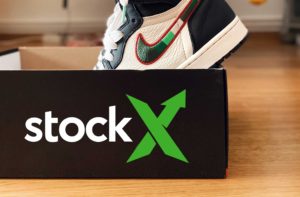
StockX is a popular sneaker resale platform that has gained quite a lot of traction in recent years. It operates similarly to a stock market, where buyers and sellers can place bids and asks on sneakers. Once a buyer and the seller agree on a price, the transaction is completed, and StockX handles the shipping and authentication process. Payment is made to the seller once the buyer receives the sneakers and confirms that they’re authentic.
Pros: StockX offers a high level of authentication, which can give buyers confidence in their purchases. The platform also has a large user base, which can increase the chances of a sale. StockX offers multiple payment options, including PayPal, credit card, and ACH bank transfer.
Cons: StockX charges a 3% processing fee and a 9.5% seller fee, which can add up quickly. The platform also has strict guidelines for the condition of sneakers, making it difficult to sell used or slightly worn pairs.
GOAT

GOAT is another popular sneaker resale platform that focuses on authentication. It operates similarly to StockX, where buyers and sellers can place bids and asks on sneakers. Once a transaction is completed, GOAT handles the shipping and authentication process. Payment is made to the seller once the buyer receives the sneakers and confirms that they’re authentic.
Pros: GOAT has a large user base and a high level of authentication, which can give buyers confidence in their purchases. The platform offers multiple payment options: PayPal, credit card, and ACH bank transfer. Additionally, GOAT has a feature called “Instant Ship,” which allows sellers to ship their sneakers immediately without waiting for authentication.
Cons: GOAT charges a 9.5% seller fee, which can eat into profits. Strict guidelines.
eBay
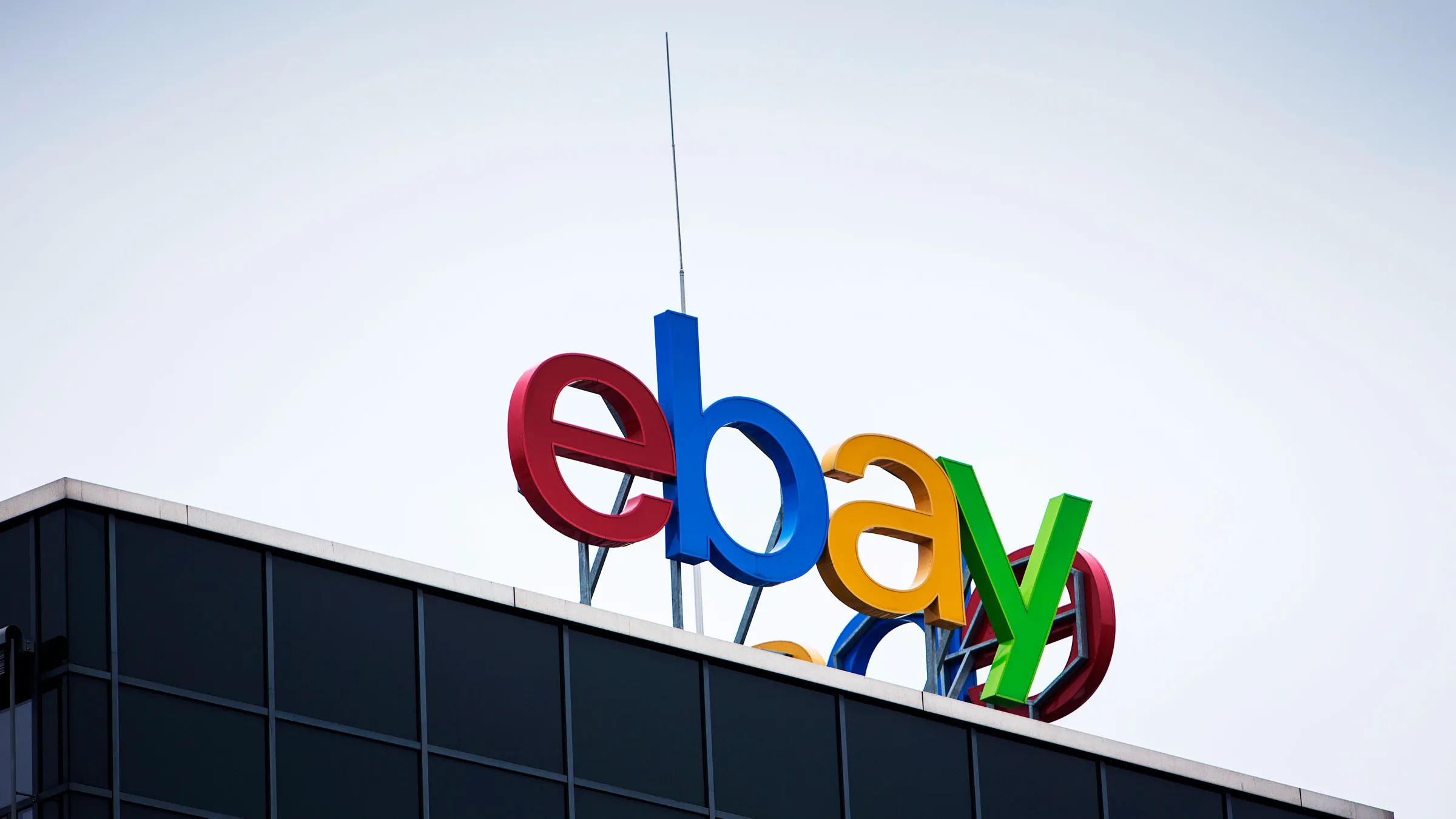
eBay is a well-known online marketplace that has been around for decades. It allows sellers to list sneakers (or anything else) for sale, set their own prices, and handle shipping and authentication themselves. eBay offers multiple payment options, including PayPal, credit card, and ACH bank transfer.
Pros: eBay has a large user base, allowing sellers to set prices and shipping options. The platform also offers multiple payment options, making it easier for sellers to receive payment.
Cons: eBay charges a 10% seller fee (up to 12% for some categories), which can eat into profits. The platform also has a reputation for fake or replica items, which can make buyers hesitant to purchase sneakers.
Craigslist/Facebook Marketplace
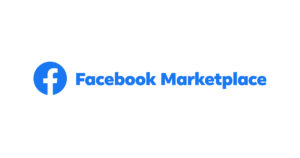
Craigslist and Facebook Marketplace are online classifieds platforms allowing sellers to list items for sale in their local area. The seller handles everything from listing the item to shipping and payment.
Pros: Craigslist and Facebook Marketplace are free to use and allow sellers to keep all profits. They also offer a local audience, making selling in person easier and avoiding shipping costs.
Cons: These platforms need an authentication process, which can make buyers hesitant to purchase sneakers. Additionally, sellers may have to deal with lowball offers or unreliable buyers.
Flight Club
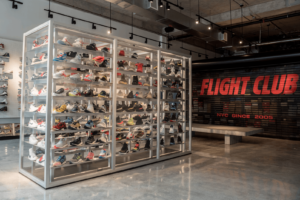
Flight Club is a premium sneaker consignment marketplace. It offers various sneakers from different brands, including Nike, Adidas, and Jordan. The platform has a strict policy for authentic sneakers only, so buyers can be confident they purchase legitimate products.
Selling on Flight Club is straightforward. Sellers can ship their sneakers to Flight Club or bring them to one of their retail locations in New York or Los Angeles. Once the shoes are authenticated and listed for sale, Flight Club takes care of the rest of the process, including shipping and handling. The platform pays sellers once the sneakers are sold, with payment options including bank transfer, PayPal, or Flight Club credit.
Pros: Flight Club offers high trust and credibility due to its strict authentication process. It also has a large customer base of sneaker enthusiasts willing to pay top dollar for rare and exclusive sneakers.
Cons: Flight Club takes a 20% commission fee on all sales, which is higher than other platforms. Also, sellers must cover shipping the sneakers to Flight Club.
Grailed
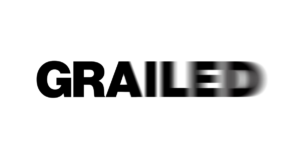
Grailed is an online marketplace for streetwear and luxury fashion, including sneakers. The platform offers a wide range of products from different brands, including Supreme, Palace, and Off-White.
Sellers can create listings for their sneakers, and Grailed offers tools to help sellers price their products accurately. Once the sneakers are sold, Grailed takes a commission fee of 6% of the sale price. Payment options for sellers include PayPal, Stripe, or bank transfer.
Pros: Grailed offers a user-friendly interface and tools for sellers to price their products accurately. The platform also has a large customer base of streetwear and sneaker enthusiasts.
Cons: Grailed does not offer authentication services, so buyers must rely on the seller’s reputation and the product’s authenticity. Additionally, the 6% commission fee is higher than some other platforms.
Stadium Goods
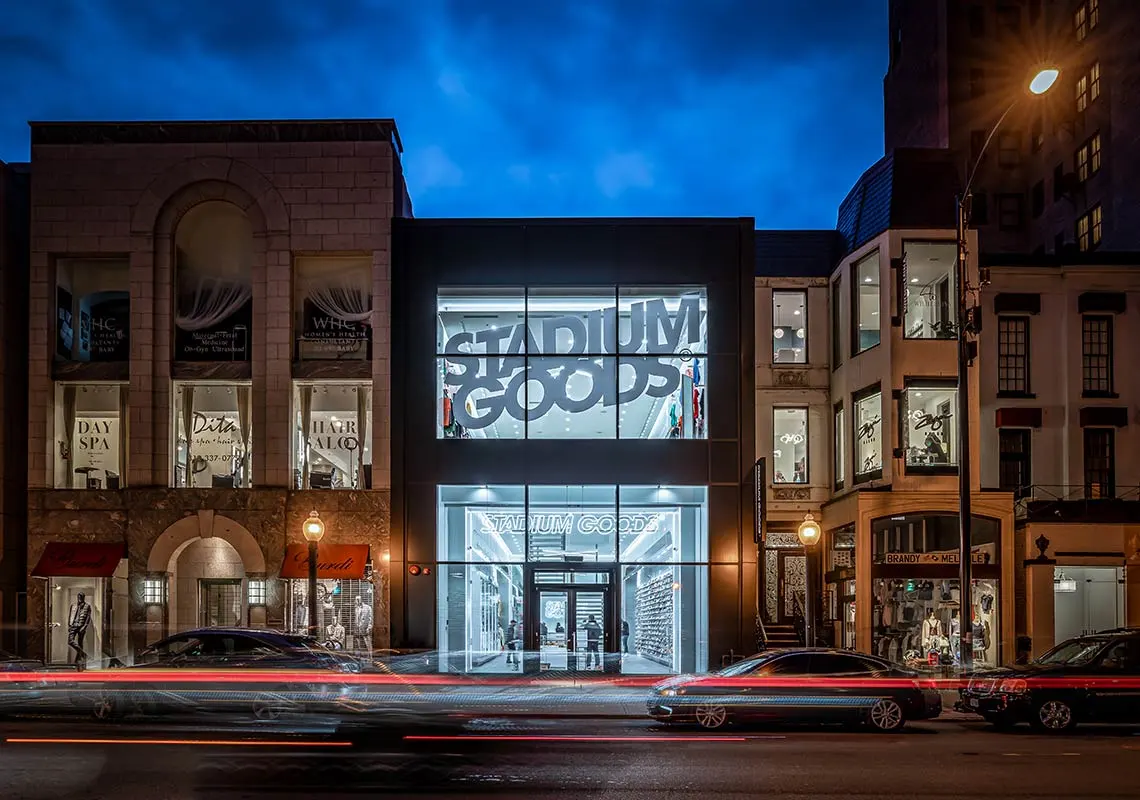
Stadium Goods is a premium sneaker and streetwear marketplace specializing in high-end and exclusive products. The platform offers a wide range of products from different brands, including Nike, Adidas, and Jordan.
Sellers can ship their sneakers to Stadium Goods, and the platform handles the authentication and listing process. Once the sneakers are sold, Stadium Goods pays the seller via PayPal, ACH bank transfer, or Stadium Goods credit. The commission fee on Stadium Goods ranges from 10% to 30%, depending on the product’s value.
Pros: Stadium Goods offers high trust and credibility due to its strict authentication process. The platform also provides competitive commission rates for high-value products.
Cons: The commission fee for lower-value products can be higher than other platforms, and sellers must cover the cost of shipping the sneakers to Stadium Goods.
Round Two
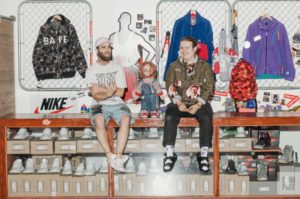
Round Two is a vintage and streetwear consignment store located in several US cities. The platform offers a wide range of products from different brands, including Nike, Adidas, and Jordan.
Sellers can either bring their sneakers to a Round Two location or ship them to the store. Once the sneakers are authenticated and listed, Round Two takes care of the rest of the process, including shipping and handling. Payment options for sellers include PayPal, Venmo, or Round Two credit. The commission fee on Round Two varies depending on the product and location of the store.
Pros: Round Two offers high trust and credibility due to its strict authentication process. The platform also has a large customer base of vintage and streetwear enthusiasts.
Cons: The commission fee on Round Two can be higher than on other platforms, and sellers must cover shipping the sneakers to the store if they choose to sell them remotely. Additionally, Round Two only has physical locations in certain cities, which may limit access for some sellers.
Each platform has its own unique benefits and drawbacks for sneaker resellers. It’s good to consider all factors, such as commission fees, authentication processes, payment options, and customer base, when deciding which platform to use. Finding the right platform for your needs can help you maximize profits and grow your sneaker reselling business.
Build Your Inventory
Start building your inventory by purchasing sneakers that are in demand. Look for good deals at retailers, online marketplaces, and other resellers. You can also attend sneaker conventions or events to find rare and unique sneakers to add to your collection.
Launch Your Business
Once you have a solid inventory and sales strategy, it’s time to launch your business. Create a brand identity and build a website or social media account to showcase your products. Use social media platforms to build your brand and connect with potential customers. You can also join sneaker communities or forums to network with other sneakerheads and learn about new releases and trends.
How To Select Sneakers to Buy

Selecting the right sneaker for resale is crucial because it can significantly impact the profitability of your resale business. Some sneakers may have a higher resale value and demand than others, allowing you to make a larger profit margin. On the other hand, some sneakers may have a lower resale value or be challenging to sell, resulting in a lower profit or even a loss.
By selecting the right sneakers to buy and resell, you can increase your chances of making a profit and growing your business. This involves researching market trends, understanding consumer demand, and identifying the most sought-after sneakers.
In addition, selecting the right sneakers to buy and resell can also help you establish a reputation as a knowledgeable and trustworthy seller within the sneaker community. If you consistently offer high-quality sneakers with a good resale value, customers are more likely to return to you for future purchases and recommend your business to others.
Overall, selecting the right sneakers for resale is crucial in building a successful and profitable sneaker resale business. It requires careful research, analysis, and attention to detail to ensure that you are making informed buying decisions and maximizing your potential for profit.
When selecting sneakers to buy for resale, several factors must be considered to ensure that you make a profitable investment. Here are some practical sneaker resale tips to help you select the best resale value sneakers:
Brand
Popular brands such as Nike, Adidas, and Jordan tend to have a higher resale value due to their widespread popularity among sneaker enthusiasts. However, some lesser-known brands may also have high resale value if they have a unique design or limited release.
Limited Releases
Collectors often highly demand Limited-release sneakers and can command a premium price in the resale market. Watch for special editions, collaborations, and releases with limited production numbers.
Condition
The condition of the sneaker is an essential factor in determining its resale value. New or “deadstock” sneakers in their original packaging generally cost more than used or worn sneakers. When evaluating used sneakers, look for minimal wear and tear, no scuffs, and minimal sole wear.
Size
Larger and smaller sizes of popular sneakers can have a higher resale value due to their limited availability. Sizes commonly worn, such as US men’s 9-11, may have a lower resale value due to their higher availability.
Colorway
Sneakers with unique or rare colorways can have a higher resale value, especially if the colorway was only released in limited numbers.
Market Demand
It’s essential to research the market demand for the sneaker you’re considering purchasing. Check various online marketplaces and forums to see the going price and whether the demand is high or low.
Authenticity
Ensure that the sneakers you’re considering purchasing are authentic. Counterfeit sneakers not only have no resale value but can also harm your reputation as a seller if discovered.
Considering all these factors, you can make an informed decision and select sneakers with a high resale value, ensuring a profitable investment.
How to Evaluate The Value of Resale Sneakers

Evaluating the value of resale sneakers requires some knowledge and research, but it can be a worthwhile investment for those looking to profit. The things to look out for here are similar to the factors you would look for when selecting a sneaker or checking for fake sneakers.
- Check the condition
- Research the model and brand
- Check recent sales
- Consider the size and colorway
- Authenticity
Why is the Sneaker Resale Industry So Big?
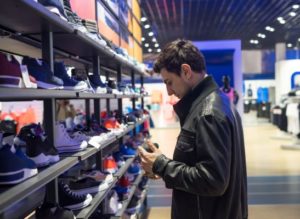
The sneaker resale industry has become a billion-dollar business in recent years, and the question is, why is it so big? The answer depends on a combination of factors, including the increasing demand for limited edition and exclusive sneakers, the rise of the internet and social media, and the evolution of the sneaker culture.
Sneaker enthusiasts and collectors have always sought out limited edition and exclusive releases. These are the sneakers that are hard to come by, and therefore, their value increases over time. Sneaker brands like Nike and Adidas have capitalized on this trend and released limited-edition collections, creating exclusivity around them. This exclusivity increases their demand, leading to higher prices on the resale market.
The rise of the internet and the mass adoption of social media has transformed the sneaker industry. People can now buy, sell, and trade sneakers on online platforms like eBay, StockX, and GOAT. The internet and social media have also made it easier for sneaker enthusiasts to connect and exchange information about upcoming releases and trends. This increased connectivity has led to more demand for specific sneaker models, leading to higher resale prices.
The sneaker culture has evolved over the years. Sneakers are no longer just athletic shoes; they are now seen as fashion accessories and status symbols. Sneakers have become a way for people to express their personalities and style. This cultural shift has driven the demand for sneakers, especially those rare or exclusive, leading to a surge in the sneaker resale industry.
The sneaker resale industry has also become big because of the emergence of consignment shops. These shops provide a platform for sellers to reach a wider audience, and they take a commission on each sale. This business model has allowed sneaker enthusiasts to profit from their collections, leading to more people getting involved in the sneaker resale industry.
The sneaker resale industry is so big due to a combination of factors, including the increasing demand for limited edition and exclusive sneakers, the adoption of the internet and social media, the evolution of the sneaker culture, and the emergence of consignment shops. As the sneaker industry continues to grow and evolve, the sneaker resale industry will also continue to thrive.
What are Some of the Expensive Sneakers to Resell?
If you’re interested in reselling sneakers, knowing which pairs are likely to fetch the highest prices is important. Some of the most expensive sneakers to resell include vintage Air Jordan 12s, particularly the Air Jordan 12 Flu Game shoes that Michael Jordan wore during a pivotal game in the 1997 NBA Finals. These shoes can fetch up to $100,000 on the resale market.
Kanye West’s sneaker, Nike Air Yeezy 2 “Red October,” is another highly coveted pair, with resale values ranging from $5,600 to $6,400. The Nike Air Mag Back to the Future was inspired by Marty McFly’s shoes in the movie. It has a limited run of 1,500 pairs sold through auction, with proceeds going to the Michael J. Fox Foundation for Parkinson’s disease research. These shoes can fetch prices of over $10,000.
Finally, the Travis Scott Air Jordan 1 Nikes, which initially sold for less than $200, now have a resale price of anywhere between $2,000 to well over $4,000 due to their unique design elements and association with the rapper.
The resale price for the average sneaker varies greatly depending on factors such as brand, model, condition, and demand. Generally, popular brands like Nike and Adidas tend to have better resale values due to their widespread popularity and limited edition releases. However, for most average sneakers, the resale price may range from a few dollars above the original retail price to several hundred dollars.
In many cases, the resale price for an average sneaker may be similar to the retail price, especially if it’s a commonly available model that is not in high demand. For example, a pair of Nike Air Max or Adidas Superstars that are widely available may only have a marginal increase in resale value.
On the other hand, limited edition releases or collaborations with popular artists or designers can significantly increase the resale value of a sneaker. For example, a limited-release Adidas Yeezy Boost model or a partnership between Nike and a famous designer may have resale values several times higher than their retail price.
Ultimately, the resale price for the average sneaker depends on various factors, and it’s important to do thorough research to determine the potential resale value of a specific model before making a purchase for reselling purposes.
How to Identify Fake Sneakers

Identifying fake sneakers is a core part of your sneaker resale business, as you would have to assess sneakers, buy and then resell them for a profit. Buying fake sneakers means you won’t be able to resell for the expected price to make a profit. Unfortunately, as the sneaker industry continues to grow, so does the market for fake sneakers. Spotting a fake sneaker can be challenging, but there are several important things you can look for to help identify them.
Tips to help you identify fake sneakers:
Check the box
Authentic sneakers come with high-quality packaging, which includes a box, tissue paper, and other accessories. The package should have a label with the brand name and logo and the shoe’s size, style, and color. Make sure to check the label for spelling mistakes or any irregularities. Counterfeit sneakers often come in cheap, poorly made packaging with inaccurate labeling.
Look at the stitching.
Authentic sneakers have precise stitching with no loose threads or frayed edges. Fake sneakers often have uneven or sloppy stitching.
Inspect the sole
The sneaker’s sole should have a consistent pattern with no visible glue marks. The rubber should be firm, with no signs of wear or tear. Counterfeit sneakers often have uneven or poorly made soles.
Check the materials
Authentic sneakers use high-quality materials like leather, suede, and breathable mesh. Fake sneakers often use lower-quality materials, such as plastic or cheap synthetic materials.
Look for serial numbers
Many authentic sneakers come with a unique serial number, which can be found on the label or inside the shoe. Check the number against the manufacturer’s website to ensure authenticity.
Purchase from a reputable seller
If you need clarification on the authenticity of a sneaker, it’s best to purchase from a reputable seller. Avoid buying from street vendors or online marketplaces with questionable reviews.
By following these tips, you can better identify fake sneakers and ensure you purchase an authentic pair. Remember that counterfeit sneakers harm the sneaker industry and can also be of poor quality, leading to discomfort or even injury while wearing them.
Sneaker Resale Tips for Students in 2023

With the rise of social media platforms and online marketplaces, it has always been challenging for students to start a side hustle in the sneaker resell business. However, like any other business, success in sneaker resale requires knowledge, strategy, and hard work.
This final section is meant to give you practical tips for students looking to enter the sneaker resale market in 2023.
Research
Before you invest your money in any sneaker:
- Do your research.
- Look up current trends, popular styles, and recent releases.
- Use resale platforms to understand what sneakers are in high demand and what they are selling for.
Start small
Investing all your money in one big purchase can be tempting, but starting small can be a better way to gain experience and build your reputation as a seller. Start with lower-priced sneakers and work up as you gain more knowledge and confidence.
Authenticate your sneakers
Make sure you know how to authenticate sneakers to avoid buying fakes. This will protect your investment and keep your reputation intact.
Build relationships
Networking is important in the sneaker resale world. Attend events, follow sneaker influencers on social media, and reach out to other sellers to build relationships and gain insider knowledge.
Price competitively
Be mindful of the market and set prices accordingly. Don’t try to price gouge, but don’t sell yourself short. Use data from resale platforms to set fair prices.
Be patient
Sneaker resale is a waiting game. It takes time to build a reputation and gain traction in the market. Keep going even if your sneakers sell right away. Keep promoting your inventory and building your brand.
Stay organized
Keep track of all your sneakers, sales, and expenses. This will help you keep your business alive and make informed purchase decisions.
